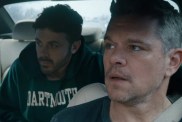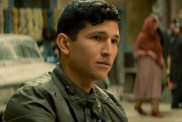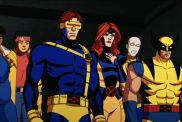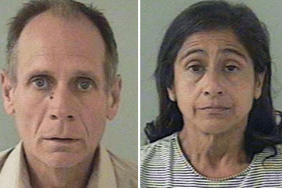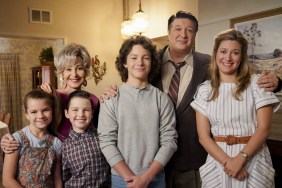An exclusive with the director and producer

Appropriately enough, it was a 2004 feature called Hardcore that placed Greek director Dennis Iliadis at the helm of a remake to The Last House on the Left. Released in 1972, the term “hardcore” could certainly describe Wes Craven’s original film as its tale (inspired by Ingmar Bergman’s The Virgin Spring) combined a rape/revenge formula that yielded a disgusted reaction in some movie-goers. A former stage and commercials director, Iliadis launched into his update on the film – starring Tony Goldwyn, Monica Potter, Sara Paxton and Garret Dillahunt – with very little fear. He considers the horror genre a “great dramatic platform,” after all, and if he’s skimping on the visceral effects, then he believes he’s not doing his job. ShockTillYouDrop.com met with producer Wes Craven as well as Iliadis in Beverly Hills. The latter was on one of his many trips to the U.S. to promote the film and line up his next project.
ShockTillYouDrop: Many people are divided on the original Last House. Where do you fall in? Do you love it or hate it?
Dennis Iliadis: The original is fascinating. There are some scenes I love, especially the one in the forest right after they’ve done these horrible things and this beautiful music comes in. There’s this ambiguity. Time stops. I wasn’t crazy about some of the comedic elements. But they were so out there and so avant-garde. The decision to inter-cut a rape with these comedic scenes was very weird, art house in a way. I think we tried to approach it was more consistency. Really trying to work the drama immediately and cut those diversions out of the pictures. I wanted the movie to throw you into this scene with no place to cut away to. Because if you cut away, you have this feeling you’re leaving the moment and things could turn out differently, but here, every second and every behavior counted. That’s why we made it a bit more dramatic and stayed on them. That was instinctual to me because in early scripts there were some cutaways, but I thought we should just stay with it. Be in the moment with no easy way out.
Shock: This version definitely distills the idea to its most raw elements.
Iliadis: It’s such a powerful core. And we looked the Bergman film [The Virgin Spring], and it’s such a powerful core that you don’t have to look at what preceded it because it’s such a strong story. I have to give it all I got and I don’t have time to reference anything.

Shock: Wes, what are the differences between Craven the director and Craven the producer? Do you take a hands-off approach as a producer? Do you let the director do their thing?
Wes Craven: Pretty much. There was one film recently where I stepped in quite a bit – wasn’t too happy about it. With Alex Aja [and The Hills Have Eyes] I was never on the set. With this, I was on another film while they were in South Africa. I saw the dailies and was totally confident. I was there a lot when we were during the concept and getting the scripts. We had two or three versions of this before we settled on Adam Alleca’s script and brought in Carl Ellsworth. So there was a lot of involvement with script notes and so forth. Once Dennis was on the scene, I was being absorbed with 25/8. I liked where he was going, I think I went to one or two casting sessions.
Shock: During that scripting period, what were the other writers not getting right?
Craven: It was a complex thing of updating – how much of the Krug family do you show? There were a lot of different ideas on that. What in the original do you keep or drop? Does Mari live or die? That was a discussion that went on for a long time. Do you have Junior, or the equivalent of Junior? Beyond that, there was a certain point where Dennis’ sensibilities kicked in and we got in the ballpark and he went with it. He’s extremely attentive to actors. On Hardcore he did a month of rehearsals. I think on any given film I did two days, maybe. But he insisted on it, so he had a week on this. Sometimes he would spend a lot of time on shots, like the girl going into the swimming pool. People would find that stupid, but not only is the shot the best one in the movie, I think, but one of the best shots I’ve seen in film for some time. They built the house so the actors felt they were in a real place. He’s very, very thorough. Dennis has a great sense for music, his temp score wasn’t horror at all. We had some real concerns about it, like an American audience wouldn’t be able to sit through it. But they got it.
Shock: Dennis, how did you come about finding your cast?
Iliadis: We were not trying to be obvious. Trying to get people who won’t play these characters in stereotypical ways. With Garret [Dillahunt], everyone who came in before him was playing Krug with a squinty eye and raspy voice. What the hell? My feeling is, if you get the ambiguities right, he’s much more terrifying. However evil Krug can get, he still has a sense of humor. He’s supposed to be a father and Garret realized all of that, keeping those things alive. By having time to rehearse, I really pushed the actors in the beginning and I just sat back and enjoyed it. They got this extra freedom to keep it very real.
Craven: You always look for someone who is, in a way, going to do it not the way every actor would do it. You’re looking for that originality. Because you have to rely on the actor. You can’t write everything and tell them exactly what they have to do. Even when finding Robert Englund [for Freddy Krueger], I started by looking at big stunt guys who could do the stunts. Then we looked at old men for the “old man” element. Those that were alive had reached a certain gentleness. The stunt guys have a totally different mentality. They don’t want to go someplace dark and creepy. Robert Englund wanted to. You need an actor who can bring a complete sense of commitment to that character without making it silly and not be afraid to go in there to the point where someone might say, “Oh, you got bad in you?” You have to be brave enough and mature enough to know we’ve all got it, and you’re not afraid of putting it out there and if you’ve got a problem with seeing that, tough. [laughs] Garret was fresh and new, he could go there.

Shock: Did Hardcore stylistically or thematically influence your approach to this film in any way?
Iliadis: There are some common grounds in the sense that they go very dark while keeping the characters human. It was good training and it had the challenge of doing super controversial stuff. After Hardcore I had priests after me. I don’t mind doing controversial stuff…but not making it enjoyable in any way. Hardcore had nudity and some very difficult scenes – it had a sixteen-year-old girl have an existential breakdown during an orgy. That’s training. Doing scenes like that with respect to the actors, you always focus on the character over going for the easily titillation. So that film was great training.
Shock: Was there ever a fear that you were not going to be able to go as far as you could in this?
Iliadis: You know? I think what we did is take some stuff out which was made for shock value back then. We knew if they were tagged back in, there was no way this film would get a rating. We tried to make our story more organic then go as extreme as we could.
Shock: Going back to your dialogue with the actors, how do relay that they can trust you through some of the scenes in this film?
Iliadis: Sometimes, in horror movies, you get the feeling the people who make them don’t love actors. They want to make them accessories to the genre conventions. I’m not of that school, I love actors and I love working with actors. I love giving them that space. My rehearsal tactics were a bit unknown to the actors. They wondered why they were getting such space. So I think that rehearsal period helped them to trust me. Then during the shoot they were allowed to focus on their character while keeping in mind the extremity of the situation. The moment you’re doing an extreme scene and you’re thinking about how extreme it is, you’re f**ked.
Shock: Was that your decision to feature the Death in Vegas song at the end?
Iliadis: Yes, it was great. It has this slight irony because of what precedes it. It keeps you slightly off balance. We needed a song that was ironic and innocent at that time. Seeing this iconic house and other images while having this song that’s childlike…almost evoking what everything was like before and how it will never be the same again. I don’t think this family is going back into that house again!
Craven: That was a song we had to fight for in our little circle. Like, “Nobody is going to know who they are. Let’s do a Death in Vegas type thing” but we never allowed it to go that way.
Shock: Everyone walks away in this film damaged goods. I had spoken to the writer, Carl Ellsworth, about this film’s sense of hope which is a contrast to the original’s bleak nature…
Iliadis: I would feel it would be a cheat if it felt like this had a happy ending. The moment you see the three-person family you started with at the end…these people have been marked forever. It was interesting to show this family in a different light. In the beginning, when Carl wrote this, I questioned if we were wussing out. In the end, what it did is it helped you see the whole family physically alive but dead in many ways. And by having the daughter fighting to survive, it wasn’t just about revenge. These parents are trying to protect their baby and they would do anything to keep her alive. It’s a much more valid notion. There’s this tendency now to go torture porn and all of that. I didn’t like the idea of the parents devising torture tactics. It had to be this urgency. Our daughter is here, we have to keep her alive and no one is going to get in our way. By keeping this spirit alive, it’s much more powerful. They’re destroying the code of what a family is.

Craven: I suggested at one point that Krug having a son who commits suicide is important, but it’s also interesting to see this strange Romeo and Juliet thing happening. I also like having a father who’s a doctor, like in the original, but having one who gets to use what he knows to save his daughter’s life. It took on a reality when he has to improvise a way to restore a collapsed lung. It made it real. I thought it was an extraordinary moment that Carl put in. This family is doing what they have to. At the end, the father does take revenge. You can argue that it’s not such a heroic thing to do. But it isn’t. He’s human, so it’s not like we’re trying to make these people heroic. You see them warts and all.
Shock: Let’s dig into your thoughts on remakes, Wes. This is the second one you’ve gotten behind. Do you pay attention to what the fans are saying?
Craven: I’m notorious for not checking in on what the fans are thinking, because I think it should be the other way around. You should be thinking about what your view of things is. Because if you do that, then you give the fans something original. Sometimes the fans are dead wrong or angry but I just don’t follow fans. I like fans, but I don’t follow the sites and stuff like that. The thing I always say is do a film that you’ve never seen before and something that you would go out of your way to see. If you can do those two things, which is extremely hard – the second part isn’t so hard – but to think of something you’ve never seen before. That’s the trick.
The Last House on the Left opens in theaters March 13th.




Source: Ryan Rotten, Managing Editor
